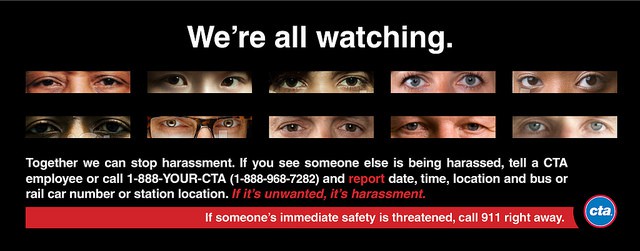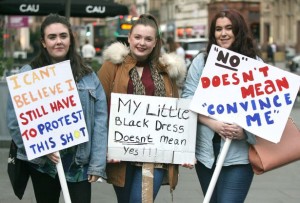Libby Allnatt, Phoenix, AZ, USA, SSH Blog Correspondent
 Are you the kind of person who tells someone when they have something stuck in their teeth, or do you let it slide? What about toilet paper on their shoe?
Are you the kind of person who tells someone when they have something stuck in their teeth, or do you let it slide? What about toilet paper on their shoe?
Some things are okay to point out.
There are also areas where commentary is off-limits unless invited.
Other people’s bodies, and other aspects of an individual’s appearance, especially if they are a stranger, would be included in that list.
The motives behind street harassment are diverse. A harasser may even have no motive, simply a senseless act of disrespect or violence. But entitlement is surely an aspect – either entitlement to one’s body (as in the case of groping or physical violence, for instance), entitlement to one’s time or attention (as in the case of being followed or catcalled), or a mix a both.
It’s almost comical when street harassment crosses into the territory of feedback. What’s the point of hollering at a young girl what you like and don’t like about her appearance? Would you pass a man and yell, “It looks like you have a superiority complex and I think you should seek professional help for that”?
Some of the absurd things harassers say would be almost funny due to how stupid they make their speakers look if they weren’t so violating, degrading, threatening and downright terrifying.
After my age and young look, the most common topic of the catcalls and comments I receive center on my clothing or style.
Catcalls, sexual/sexist remarks, groping, leering, and assault. Street harassment limits people’s access to public spaces. #SAAM #stopSH pic.twitter.com/68ZZQ94TGi
— Anna M Bogdan (@AnnaMBogdan) April 2, 2017
And it’s not just the creepy perverts that lurk in alleys and on street corners. I’ve had guys I know (both well-meaning and blissfully ignorant) comment on everything from the amount of makeup I wear (too much or too little) to the appropriateness of my clothing (you’d think some men have never seen leggings before).
A male acquaintance even once asked me to grow my hair out because he “liked it better long.” Um, excuse? And I like your mouth better shut.
Don’t get me wrong. Compliments can be wonderful. I often tell women how much I love their dress or perfume. A nice comment can go a long way. But as has been discussed many times, street harassment isn’t a compliment, so catcalls from men across the street and mutters of profanity as I pass don’t fall into that category.
In addition to compliments, there’s also a huge difference between warranted feedback and unwarranted harassment. A female friend admitting she’s not a huge fan of my outfit choice when I’m picking out something to wear (and asking for her advice) is a far cry from a man shouting, “WHY DON’T YOU SHOW MORE LEG” from across the street.
I know I’m preaching to the choir. Chances are if you’re reading this, you’re someone who has either been a victim of street harassment (if you’re a woman, the chances are high) or someone genuinely trying to understand more about the issue. I doubt the men that holler at us on the street are going online to read about street harassment communities and how their actions impact others’ safety and well-being.
But there are ways we can all be aware of how our language impacts others. Laughing at someone’s outfit? Maybe they spent a lot of time picking it out and are really excited to express themselves. Hear a guy analyzing a woman’s every curve? Ask him why he thinks she would care.
If you’re a dude reading this, you need to be aware of the appropriate ways of interacting with women. Generally, commenting on her appearance won’t get you anywhere, even if you think you’re being nice. It may be “bullshit PC culture” to you. But for us, it’s survival.
I hate to break it to you, but she probably doesn’t care what you think. You might even be creeping her out. It’s not personal. But given the prevalence of street harassment and genuinely threatening experiences women have, she’s likely learned to keep her guard up for protection.
Fellas: If a girl is turned away from you, giving one-word responses, stop trying to talk to her. It’s not personal, it’s survival. #stopSH
— Libby Paige (@LibbyPaigeA) April 19, 2017
While certainly anyone can be harassed, being aware of the ways that women’s bodies are continually policed, degraded, mocked, violated and sexualized is an especially important part of the framework.
We are not zoo animals to be gawked at, or artwork to be absorbed with the eyes and critiqued.
We are people wanting to walk down the street.
Libby is a student at Arizona State University. Originally from Salt Lake City, Utah, she is majoring in journalism with a focus on print and she is minoring in psychology and women’s studies. You can follow her on Twitter @libbyallnattasu and Instagram @LibbyPaigeA.



